This masterful synthesis provides a much-needed, complete survey of European colonialism from 1700 to decolonization in the twentieth century. Written by an award-winning author, this advanced undergraduate and graduate level textbook bridges, for the first time, the early modern Atlantic empires and the later Asian and African empires of 'high imperialism'. Viewing colonialism as a phenomenon of contact between Europe and the rest of the world, the author takes an 'entangled histories' approach, considering the surprising ways in which the imperial powers of Spain, Portugal, Great Britain, France and the Netherlands displayed their identities in colonial settings, as much as in their imperial capitals. The author illuminates for students the common themes of colonial government, economic development and cultural contact across empires, and reveals the ways in which these themes played out, through contrast of the differing development, structure and impact of each empire.
'Maintaining both a comparative and transnational focus, [Lehning] offers a detailed consideration of the social, economic and cultural changes wrought on societies and communities by the varied impacts of colonial rule. The result is a refreshingly ambitious history that, among other things, will allow students to connect North and South American colonial encounters, ideas and arguments.' Martin Thomas, University of Exeter








